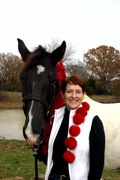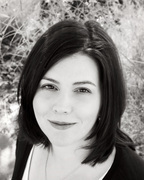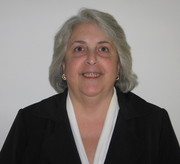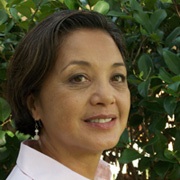Crowsister
I wrote this to explain to people what it is like to have DID (Dissociative Identity Disorder) for ME. Not how it affects others, as everyone is affected differently. This is simply how it impacts on me.
Observations of a multi-faceted “I”
Flies have amazing multi-faceted eyes – they see a lot of different images at once from all directions. Enormous multiple-focus insect eyes; taking in the world from so many different directions all at the same time, so many different pieces all streaming into one little mind, melding and merging and making one clear picture of the world for the fly. What an amazing feat in such a small creature.
That is one way to describe how I see the world. Many different pieces seen from many different angles all at the same time; pieces which have to be processed and dealt with so that I can function as one person. For me this is mazing rather than amazing, in that I am lost in a maze – I am mazed by life, by its twists and turns, and by finding myself in dead-ends with no way of knowing how I got there and no clear way to get myself out.
Picture people sitting in security offices, monitoring banks of security cameras – cameras flicking from one to another on one monitor, or many cameras on many different monitors; trying to watch all the things at once in order to make sense of what is going on “out there”. Constant monitoring; watching, catching movements, concentrating harder on things that seem out of kilter or that don’t fit, poring over the tapes, watching the jerky movements from a camera that records in slower frame sequences, trying to see what was missed out in that stuttering gap between frames.
In some ways, that reflects my life, especially that stuttering gap between frames by which I guess what came before; and anticipate what comes after. This is so deeply ingrained in me that my behaviour to casual observers flows smoothly across. This is so integral to the multifaceted “I” that I am; for the most part no-one observes the gaps.
Looking back down my life, though, there are obvious and terrible gaps. Gaps and twists and turns and dead-ends that have left me without any means of finding my way. It is with regret that I see this, and sorrow for my family and friends that have been caught up in the hive that is me. For my children this must have been particularly difficult. It has been terribly hard for me, also.
Some people with DID [Dissociative Identity Disorder] present with what appears to be a number of discrete and whole-seeming personalities. When DID is dealt with or shown on TV, films, or the print media, this is generally the kind of presentation that journalists prefer. Not all people with the disorder are exactly like that – each person develops the disorder through different situations and from different starting points. Unfortunately, the media quite like to exploit people who have startlingly different alters and who make what they think will be “good viewing” or will raise the circulation of their paper. The reality for many is not quite like that, and the damage done to people who are already trying to deal with a terrible problem is quite severe. In saying that, I offer no criticism of those who do present with those behaviours; they are making their way in the world as best they are able, under very trying, indeed heartbreaking, conditions.
Having the disorder is hard enough, though, without having to deal with the false expectations and cruelty of people who have built up their own idea of what the disorder means by observing these more public faces; people who then have a clear and incorrect picture in their minds of how a sufferer will behave, react, live. Disclosure of a psychiatric illness or disorder is always difficult; and very much up to the individual and what they choose to allow people to know about them.
The publicity and ignorance around DID makes disclosure a fraught subject – whether to tell people, and maybe have them expect some sort of “peculiar” behaviour patterns from you, or whether to keep silent, and try to maintain your privacy by keeping distance from people. Both methods carry risks, both may be appropriate in different situations.
All of us make our own decisions about how we interact with people; that is no different for people whether they have this disorder or any other kind of psychiatric disorder or illness, or just people living their lives. Speaking from a personal level, how the disorder has impacted on past relationships and events makes me very wary. I am slow to trust people or to really believe in any new relationship.
If you have ever used an old computer with too many programs for the hard drive, you will be familiar with the computer crashing, freezing, working very slowly, not functioning at all how you expect it to, various “error messages”, the “programme not found” and then sometimes, the “blue screen of death” when all fails. If you have not saved your work, then you have lost it. My life has been rather like that. Things don’t work like they ought – I seem to be trying to open documents that there is no program for. I have files with unknown suffixes and there is very little room on the hard drive. Driven by necessity and fuelled with panic, I struggle to understand what is happening around me when nothing feels as it should. I smooth through things as best I can, attempting to function with tools that are not right, with programs that are not familiar, and with the hard drive freezing at the worst possible moments. I seek for what has gone before and saved in some unknown place. I deal with data that suddenly dumps itself into the middle of something else that I am doing. In all this, I am simply trying to live, to get on with things, to interact with others, and when I am able, to hold down a job.
My life is peppered with fear. Fear of losing track of why I am in the supermarket, of suddenly finding myself in a situation that I don’t understand, of not knowing where I should be, or what I am supposed to be doing. I counteract that as much as possible by keeping a diary and making notes. My calendar is full of reminders – not just of something that is due to happen today, but weeks ahead, so that I am constantly aware of what is going to happen. I carry my mobile phone always so that I always know what the day and date are. This strategy has developed over a lifetime of bewilderment, confusion, and “flying by the seat of my pants”. It does not prevent me from losing the track of my being; it does not protect me from myself entirely. For instance, I am very aware that I am the person that is more likely to be stopped at the checkout to have my bag searched.
Large stores and supermarkets are bad places for me; there are too many things, too many colours, too many lights, too many people. I easily become disorientated and start to wander. In spite of taking written notes and trying to prepare myself beforehand sometimes it is still all too much and I simply lose focus. I seem to attract the attention of staff in shops – for me the understanding that I have been wandering lost up and down the aisles long and haphazardly enough to attract store security is quite bitter.
Time itself is very changeable to me – I have no clear perception of how long things take because it varies so much. The whole day may simply vanish for me; I am left with an aching sense of loss and confusion. Conversely, the fifteen minutes that I wait for an appointment may stretch into something so formidably long that I can’t even sit still. The passage of time while I have been completely abstracted can cause me to fly into a terrible panic; I stare at my watch and try to understand how long I have been away in my head. The shock of finding myself sitting on a bench in the street and no clear idea of why I am there is like a kick to my chest.
Part of being who I am, is being in pain. Pain in the head when the internal noise gets too loud and confusing; pain in my arms and shoulders from sitting tense and crooked; pain everywhere, that is not always obviously connected with a physical cause. Sometimes I become so aware of not being “right” that I suffer what feels like a distortion of my body – as if I am lopsided, or top-heavy, or unwieldy in some way. This leads to an attempt to straighten-up or hold myself properly, a tensing and contortion of muscles, a hyper-awareness of my posture and body. If this goes on for any length of time, that brings pain also. I start to breathe too quickly, and seek to slow that down; I find myself twitching and jittering and become so conscious of my body, my limbs, that I think that I will fall. Even if I am sitting down, I feel as if I will fall. If I am walking there may be a sensation of the floor moving below me; of terrible insecurity, danger of falling through the floor. So I stumble, hesitate, touch the wall, hold on to the back of a chair, anything to still the movement of the world around me.
Touching things, grounding myself, is something I have always done without understanding why; now that I have a clearer view of my own problem, I do it quite deliberately. I even carry or wear things that I can touch in order to feel connected with the rest of the world. Sometimes that is not enough, I need to be able to touch the table, or feel the wall, to understand and locate myself. It is sometimes necessary to find a small place of peace, an oasis where I can pull myself together. The phrase “pull yourself together” has a very real and direct meaning for me. Sometimes I do need to do just that, pull myself together, because I am becoming so frazzled and unravelled that my behaviour will begin to be noticeable to others.
So I sit on a bench or on the edge of a walled flower bed and seem to be looking at the plants, or I take out my notebook and write a few words. I try to be still, and focus. People don’t think twice about it, a woman sitting quietly, writing or looking at the flowers. I don’t want them to think twice, I don’t want anyone to know how my heart is hammering, how my head is buzzing with noise, how terrified and unhappy I am. I take a moment to calm myself, so that I can get up and walk on.
One of the most difficult things I face is the apparent changeability of things. People, places, events, are not what I expect them to be. Some people are blessedly always familiar, always who I think they will be, but others are profoundly not what I expect. This bewildering aspect of my dissociation has caused me the most heartbreak, the most suffering, the most distress, of all the problems I encounter. The simple act of going to see my doctor can create an enormous problem for me. The day before I may spend worried and frightened that he will not seem to be whom I expect, or that I will not be able to communicate very well because I may be unable to connect the doctor I see with the doctor I have in my mind.
The actual consult may be fine and I may come away with a sense of relief. If it does not, then I may simply not be able to communicate very well at all, I may even be dismissive, rude, impatient and aggravated. It is even more likely that I will say very little; finding myself in the consult without a clear idea of why I am there leads me to apologise, hyper-compliance and embarrassment. Or I may simply make a joke of the whole thing, create laughter, and talk about nothing until I can leave.
This makes positive interaction with some people very difficult; I may become disorientated and unable to stay still in my head long enough to understand things. I may go away with very little idea what has been said, what has been discussed, what the outcome has been.
At this time I am mostly aware that this change in people is not part of who they are but part of who I am; I change, it is an aspect of my self that alters. Knowing this helps to keep me calm when it happens, I no longer have the absolute misery and terror of not knowing what is happening because I do mostly understand that this is an internal problem in my own system, and that helps me to manage the moment.
For the future, I cannot tell what will happen. I am adrift in my own life without much of a map. I am extremely fortunate in that I have close family members that are very loving and supportive, though they do not really understand what I am going through. I am very thankful that they do not really know what I am going through, I would like to keep them apart from this as much as possible, and so rely heavily on professional support and care.
Much of my life I have spent in internal confusion and fear, with no idea why everything is so difficult, or why my understanding of things changes so drastically, so suddenly, without warning. At this time I am working on discovering just what triggers me into the sideways flights to nowhere; I am working on understanding the different and difficult streams of consciousness that I slip between; I am working on my distrust of people, and I am trying, really trying very hard, to understand what has been done to me. Trying to forgive myself for being me; trying to come to terms with the rest of my life.









My feet have hurt all my life. My arms, wrists, hand and thumbs hurt. My legs ache and feel as if hot wires are being pulled through them, my whole body seems to have hot sharp wires being ...
Crowsister commented on Crowsister's post I simply don't know what to do anymore